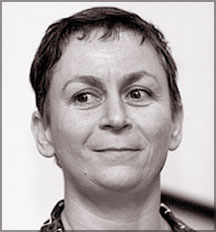
Weighing US efforts for Mid-East peace
by Jonathan Beale
It has been easy to express scepticism - even cynicism - about the
Bush administration's efforts to try to bring about peace in the Middle
East.
After all, this is an administration that throughout its entire first
term - and much of its second - has shown little sense of urgency.
|

US Secretary of State Condoleezza Rice |
There is suspicion too as to why the Bush administration has chosen
to focus on the issue now.
Is America's recent engagement little more than PR - trying to
appease growing Arab anger, trying to win support for its actions in
Iraq?
US Secretary of State Condoleezza Rice is aware of those doubts and
this week in Ramallah gave them short shrift.
"We have better things to do than invite people to Annapolis for a
photo op," she said, and then described President George W Bush's peace
initiative as "the most serious effort to end the conflict in many, many
years".
Furiously spinning
Easy to say perhaps - but there is also proof that words are being
matched by deeds. This is Ms Rice's seventh visit to the region this
year.
|

US Secretary of State Condoleezza Rice |
She has already pushed successfully for Israel's Prime Minister Ehud
Olmert and Palestinian leader Mahmoud Abbas to hold regular bilateral
meetings to discuss what she calls the "political horizon" of a future
Palestinian state.
US officials are quick to remind the sceptics that Mr Bush is the
first US president to commit himself to the creation of a Palestinian
state.
Israeli and Palestinian officials - at least those who are members of
the more moderate Fatah movement - have also started meeting in working
groups.
Both sides are also furiously spinning ahead of the forthcoming
conference - likely to take place in Annapolis, in the US state of
Maryland, and tentatively scheduled for the end of November.
Hard choices
The Palestinians have made clear that they will only attend if the
discussions are to address the detail of the most intractable problems -
the expansion of Jewish settlements, the final status of Jerusalem and
the return of refugees.
Mr Olmert, too, has been making clear that he has little room for
political manoeuvre. Does either Mr Olmert or Mr Abbas have the
political backing to make the hard choices?
For now Ms Rice is playing her cards close to her chest. It is not
yet clear whether she will put forward her own ideas on which the
Annapolis discussions will focus.
She clearly does not want this to be seen as America imposing its own
plan - rather, it is facilitating an agreement.
Hence she is billing the Annapolis talks as an "international"
conference.
But Syria has already warned that it might not bother turning up -
and Ms Rice has made no effort to woo Damascus. This administration also
continues to isolate the Palestinian movement Hamas, which seized power
in the Gaza Strip in June, ousting Fatah forces loyal to Mr Abbas.
Lacking time
There is a sense in Washington that the Bush administration is still
not doing enough. A letter to Mr Bush signed by Zbigniew Brzezinski,
former National Security Advisor to President Jimmy Carter, Brent
Scowcroft, former National Security Advisor to Presidents Gerald Ford
and George HW Bush, and by Lee Hamilton, co-chairman of the Iraq Study
Group, calls for the talks to be opened up to those Arab states that
"currently do not enjoy diplomatic relations with Israel" and an end to
Hamas's isolation.
The letter warns that "if Syria or Hamas are ostracised, prospects
that they will play a spoiler role increase dramatically".
Yet despite those concerns, few strongly criticise the Bush
administration's latest efforts, coming as they do after a seven-year
hiatus.
Not many think the Annapolis conference on its own can achieve a
breakthrough. The conditions for peace are not at their best - and time
is not on the Bush administration's side.
But, although this might yet end up as a glorified "photo op", it
could still be the beginning of a new peace process.
BBC News, Washington
Britain to claim more than 1m sq km of Antarctica
The United Kingdom is planning to claim sovereign rights over a vast
area of the remote seabed off Antarctica, the Guardian has learned. The
submission to the United Nations covers more than 1m sq km (386,000 sq
miles) of seabed, and is likely to signal a quickening of the race for
territory around the south pole in the world's least explored continent.

The claim would be in defiance of the spirit of the 1959 Antarctic
treaty, to which the UK is a signatory. It specifically states that no
new claims shall be asserted on the continent. The treaty was drawn up
to prevent territorial disputes.
The Foreign Office, however, has told the Guardian that data is being
gathered and processed for a submission to the UN which could extend
British oil, gas and mineral exploitation rights up to 350 miles
offshore into the Southern Ocean.
Much of the seabed there is at such a depth that extraction of gas,
oil or minerals is not yet technically feasible, but the claim may still
anger neighbouring South American countries who believe they have more
entitlement to the potentially valuable territory. The Antarctic
submission reflects the UK's efforts to secure resources for the future
as oil and natural gas reserves dwindle over the coming decades.
Last month the Guardian revealed the UK is working on three other
sub-sea claims in the Atlantic: around South Georgia and the Falkland
Islands, surrounding Ascension Island and in the Hatton/Rockall basin,
west of Scotland. Britain has already lodged a joint claim at the UN -
with France, Ireland and Spain - for a large area of seabed in the Bay
of Biscay.
The Foreign Office confirmed yesterday that the UK was working to
extend sovereign territory into new areas. "There are five claims in
total that the UK is hoping to put forward," a statement said. "They are
in the Bay of Biscay, around Ascension, off the British Antarctic
Territory, around the Falkland Islands and South Georgia and in the
Hatton/Rockall basin.
"We believe these five meet the geological conditions required. The
claims are based on article 76 of the UN convention of the law of the
sea."
Karen Sack, head of oceans for Greenpeace International, said little
was known about the environmental impact on marine life of drilling and
exploration at great depths.
"What we don't know is what kind of impact these [prospecting]
activities are having right now. We have more maps of the moon than we
do of the deep sea. Whenever there's deep-sea fishing there's always new
species identified. We would hope [states] would leave the [Antarctic]
wilderness as it is."
The British Antarctic Territory, first claimed in 1908, forms a
triangular wedge, with its apex at the south pole. It covers 666,000 sq
miles and has two permanently-manned scientific stations. It is due to
celebrate its centenary next year by issuing its first ever legal tender
coin.
A British submersible recently dived to depths of more than two miles
in the waters around the edge of the continental shelf. The seas are
swarming with krill, shrimp-like crustaceans, brittle stars - which are
similar to starfish - and sea cucumbers.
International interest in exploiting the new frontier on the oceans'
floors comes as global warming is opening up previously frozen seas at
the icecaps and the world's major economies are competing for fresh
energy sources.
During the summer Russia was subject to criticism for making claims
beneath the Arctic Ocean, while France registered a claim to thousands
of square miles around New Caledonia, in the Pacific.
The UK claim on Antarctica will be its most controversial because it
depends on proximity to the British Antarctic Territory which overlaps
rival land claims by Chile and Argentina. The environmental protocol to
the Antarctic treaty, agreed in 1991, currently prohibits all mineral
related activity, other than for scientific research.
Ministers will have to decide under what terms the application to the
UN would be made.
One possibility might be for the UK government to lodge a legal claim
with the UN's commission on the limits of the continental shelf and
effectively park it for consideration at a future date. The UN process
allows states to extend their territorial rights over the ocean floor on
an adjacent continental shelf up to 350 miles from shore.
These applications may be limited by rival claims from neighbouring
states. Submitting countries must demonstrate, with detailed geological
and depth soundings, precisely the outer limits of the shelf.
Guardian, UK
'Migrants in Britain are more reliable'
Migrants are more reliable and harder working than British-born
workers and are boosting economic output by œ6 billion a year, according
to a government study published on Tuesday.
Immigrants have a better work ethic than the British and are willing
to work longer hours with less time off sick. Weekly mean earnings of
migrants are also œ60 higher than their UK counterparts.
But while large numbers of migrants bring overall economic benefits,
their arrival may be hitting the wage levels of the unskilled, the study
found.
However, a separate Home Office report issued last night found
concerns in the regions over the impact of record levels of immigration
on crime, education, housing and health.
Half the areas consulted said migrants were putting pressure on
private accommodation, leading to higher rents. Other areas said that
migrants were increasing the caseloads of GPs and increasing low-level
crime and antisocial behaviour.
Liam Byrne, the Immigration Minister, welcomed the economic
contribution of migrants but admitted that the scale of change had
unsettled parts of the country. He said: "In the long run, our country
and Exchequer is better off with immigration rather than without it . .
. But alongside this there is evidence that the pace of change has been
unsettling and has created challenges."
Tuesday's report on the economic impact of immigration found that the
mean average wage for foreign-born workers was œ424 compared with œ395
for the UK-born. The study said that business leaders backed the
contribution made by migrants. They said that native workers were
sometimes unreliable in certain sectors, especially agriculture, hotels
and catering.
The Times, UK
Putin warns US against military action in Iran
Russia's president, Vladimir Putin, gave Iran's leaders a public
morale boost in their nuclear dispute with the west yesterday by issuing
a veiled warning to the US not to resort to military strikes over the
issue.
Mr Putin used a historic visit to Tehran - the first by a Kremlin
leader since Stalin in 1943 - to amplify his opposition to an American
attack against Iran. "We should not even think of making use of force in
this region," he told a five-nation summit meeting of Caspian Sea
nations.
In a coup for Tehran's leadership, he invited the Iranian president,
Mahmoud Ahmadinejad, to Moscow for talks. Mr Putin called on the five
countries - Azerbaijan, Kazakhstan, Turkmenistan, Russia and Iran - not
to allow an outside power to use their territories to launch an attack
on another member of the group.
The Guardian, UK
"Nuclear power is simply not necessary"
by Marcus Dam
By awarding the 2007 Nobel Peace Prize jointly to Al Gore and the
Intergovernmental Panel on Climate Change (IPCC), the Norwegian Nobel
Committee has more than simply underscored the need to reduce the threat
of climate change to the security of mankind.
In an interview,Gavin Edwards, Head of Climate and Energy Campaign,
Greenpeace International, talks about what governments across the world
can do to mitigate the problem and the radical paradigm shifts called
for to tackle it.
Excerpts:
How well do you think the Greenpeace campaign has been addressing the
problem of climate change, complex that it is and where collective
action at any level might have its own difficulties?
We have been sounding the alarm bells for almost 20 years now,
driving the message home that climate change and global warming is a
serious issue that demands global action and is the single biggest
threat to humankind.
|

Gavin Edwards: "Renewable energy and energy efficiency can
deliver the power that we need." |
We have to say, though, that it has been only in the last one year
the world has started to take the issue much, much more seriously and
what we see now is a shift towards the solutions to climate change in
global discourse.
But I fear that it will take another 20 years of discussions on the
issue and we simply do not have 20 years left to tackle climate change.
So our message is clear: we have been saying let us not spend the next
few years debating how to tackle the problems; the solutions are here,
they are ready-made. It is time for our governments to get much, much
serious about tackling climate change.
The responses from the governments must be varying, given that your
campaign is spread over more than 40 countries ...
We have offices in 42 countries. Governments generally agree with us
that climate change is a problem and demands action, but disagree what
the solutions are, and how bold an action needs to be taken.
Most governments readily admit that something has to be done but what
we think needs to be done is based on our assessments of the
Intergovernmental Panel on Climate Change, which calls for an 80
reduction in emissions from industrialised countries by 2050, a 30 per
cent reduction by 2020.
This is a very, very big change in life-styles, in the way we use and
produce our energy. Some radical shifts have to be made and we do not
think that governments yet realise or understand or are willing to make
the shifts needed. But that can change under public pressure in the
coming years.
Your biggest challenge must be coping with the distinctions between
the various governments in their approach to the problem ...
There are distinctions. In the United States - the world's biggest
per capita emitter - we have the White House right now that is sending
some very mixed signals on climate change and refuses to ratify the
Kyoto protocol.
Yet, there have been some really hopeful signs in what some of the
northeast states and California are doing. I think we have to wait till
after the 2008 elections before we see some real change in the U.S. I
think it is heading in the right direction - a little bit slowly, a
little bit late, but I think it is possible.
China is another example - perhaps the second biggest emitter in the
world. They are also taking steps as well, putting specific programmes
in place, to increase their renewable energy up to 15 per cent by 2020 -
setting targets for energy efficiency to ensure economic efficiency as
well. The government there has thus begun taking steps in moving in the
right direction.
One of the greatest challenges is how governments, in negative
moments, can play a little bit of a blame game. That is a recipe for
disaster. What we are advocating to any government is you have to take
up leadership.
As for India, there are people we speak to who have a very
black-and-white view of the situation. 'Do we have development or do we
have to take more action on climate change?' If you scratch below the
surface you can have development and you can have action against climate
change as well. So part of our frustration is when the debate happens on
the simplistic level on whether you can have one or the other. This is
where we need to break the deadlock.
We have had international conventions on environment that have been
signed. But has any significant dent been made in global warming in the
face of the compulsions of development and the thrust towards greater
industrialisation?
A key phrase in the United Nations' framework on climate change
agreed back in 1992 is common but differentiated responsibility. The
degree to which the different countries have to act depends on the
development of that country.
Non-governmental organisations have really focussed on industrialised
countries that have to do the lion's share of tackling climate change -
that is clear. But what is also clear is that developing countries like
India, China constantly keep on developing with the business-as-usual
old-style development approach.
They could be repeating the same mistakes the West has made in the
past few decades. And if India, China and other countries continue to
make those mistakes, then regardless of what the West is doing to tackle
climate change it will be impossible.
Everyone will have to take some action on climate change. For India,
for example, we estimate that emissions can grow; we fully recognise
economic growth is absolutely essential and we estimate that a 20 per
cent emission growth is possible but which needs to start dipping after
that.
If India builds coal-powered power stations in the next 10 years, it
makes it impossible to meet the commitments to reduce greenhouse gas
emissions. If it makes a different choice, invests in energy efficiency
through a range of measures then we can see economic prosperity but not
at the expense of climate. So in a sense India is at a crossroads.
If it makes the right choices, India can do its share even though it
is not a lion's share. But India can make a significant contribution,
and without that contribution the world could be in serious trouble.
Being recognised in a growing economy like India is a greater demand
for energy. The need for nuclear energy is being talked about. How does
such an energy resource contribute to climate change?
They may contribute to a much smaller degree than coal-powered plants
- that is for sure. But there are numerous other problems associated
with nuclear power that are still yet to be solved.
We still don't have a solution for nuclear waste. Greenpeace is
firmly against nuclear weapons and nuclear proliferation as well. The
economics of nuclear power never adds up.
Nuclear industries time and time again require subsidies from
government in order to operate. They also require subsidies from future
generations in terms of the nuclear waste that will be created as well.
But our main argument against nuclear power is that it is simply not
necessary. Renewable energy and energy efficiency can deliver the power
around the world that we need.
We are at a cross-roads right now when we can shift to a radically
different economic development model - one without coal-fire power, one
without nuclear power.
Could you give us some sort of an idea of how bad the problem of
climate change is in terms of global warming?
We are looking at less than one degree Celsius rise in temperature so
far. Even if we change course today and put ourselves on a different
energy pathway, we are looking at a warming of about 1.7 to 1.9 degrees
Celsius average globally by the late century.
Now this might not sound like a lot. The IPCC has set 2 degree
Celsius as the absolute maximum after which we go from a serious impact
on climate change to some catastrophic impact on climate change.
Even with a two degree Celsius, we are looking at 20 to 30 per cent
of all species globally being pushed to high risks of extinction. Once
we move over a two degrees Celsius rise, we are looking at refugees -
people heavily impacted by climate change shifting from one location to
the next.
Christian Aid, an NGO, has estimated that one billion people could be
affected and would have to shift one way or another. If we look at the
economics of climate change, between 5 and 20 per cent of GDP could be
affected by the late century.
It has only been in the last one year when a series of events have
happened to shake the world. The seminal moment was when Sir Nicholas
Stern launched his report last year.
The IPCC has launched three critical reports - a fairly conservative
look taking a range of sides and coming up with a consensus - that have
been more unequivocal than ever that climate change is a problem that
has had a big impact on world governments.
And then the third phenomenon we can attribute is the work Al Gore
has done for more than a decade, advocating the problems of global
warming though it has been only in the past year that it has reached a
popular audience and that has really raised alarm bells and woken people
up to the issues.
As global campaigners you must have realised that some of the
problems are often interrelated. Like poverty leading to environmental
degradation, which in turns contributes to poverty. What are the
differences and similarities in the strategies you adopt while
addressing the problems in different countries where you have offices?
We are looking at the commonalities, but different agencies work
often with differences in approach. In India, we see a much lower
awareness when it comes to climate change right now. If we look at a
recent poll by BBC World on awareness around the world, India was at the
bottom of the list.
Only 47 per cent believed that climate change was a human-induced
problem, whereas if you look at the U.S., even China, there is a higher
rating of awareness.
Critical, later this year, will be a U.N. meeting at Bali in
Indonesia where world governments will get together and hope to inject
some new life into a global agreement on climate change and look at
renewing and extending the Kyoto protocol in the second commitment
period.
Greenpeace offices and campaigners around the world will be lobbying
their national governments before the meeting on a common set of values
and a mandate we are looking for.
If we can get an outcome in Bali that says by 2009, world governments
will have to agree on a second commitment on the Kyoto protocol, there
have to be stronger and deeper cuts in emission, that industrialised
nations have to take greater action but developing countries can also
set their own targets, then we can judge that to be a success.
The Hindu India
'Depressing Irish saga' wins the Booker Prize
A desperately bleak Irish family saga featuring a suicide and sexual
abuse that has sold barely 3000 copies in the UK in five months emerged
as the surprise winner of the œ50,000 Man Booker Prize.

The Gathering, by the 45-year-old Dublin writer Anne Enright, was a
rank outsider in what was expected to be a fight between Ian McEwan,
bidding for his second win, and the New Zealand author Lloyd Jones,
shortlisted for his novel Mister Pip. Enright's victory is a major upset
that is likely to fuel increasing criticism that the prize, routinely
hailed as the world's most prestigious award for literary fiction, is
out of touch with ordinary readers.
In a vicious swipe at the Man Booker, Robert Harris, the bestselling
author of novels such as Fatherland and Enigma, said in an interview
that authors were being forced by agents to write 'Booker-winning'
novels that were "grim and unreadable and utterly off-putting for many
readers".
He went on: "They are elegant, elegiac but dull and dry. They do not
connect with their readers. They bare just deadening to read."
The Gathering is the fourth novel by Enright, a former Irish TV
producer.
It tells the story of the large and dysfunctional Heggerty family in
Dublin who gather for a wake after one of them, Liam, has walked into
the sea at Brighton with stones in his pocket. In tough, unflinching
language, three generations of the family's lies and sexual secrets,
including abuse, start to emerge.
This week, Enright, who studied creative writing at the University of
East Anglia, herself admitted that The Gathering was not the jolliest of
reads.
She said: "When people pick up a book they want something that will
cheer them up, in that case they shouldn't really pick up my book." She
went on to call it "the intellectual equivalent of a Hollywood weepie".
The latest sales figures published in The Bookseller show that The
Gathering had sold just 2,901 copies in the UK since it was published in
May.
The Man Booker judges took two-and-a-half hours to pick it as this
year's winner. Sir Howard Davies, director of the London School of
Economics and chairman of the judges, admitted that the book was
"depressing" but he said that it was "very readable" and that he
expected it to sell well. He said: "We found it a very powerful,
uncomfortable and even, at times, an angry book."
He also admitted that some people would be shocked by graphic sexual
imagery and language, though he said that "it is not pornographic". He
went on: "It is a very intense of writing which does repay re-reading.
You people will find this a very readable and satisfying novel." On a
shortlist with just one well-known name - McEwan - the fight for the
2007 prize had been regarded as wide open.
Telegraph, UK
Congress debates Chavez reforms
The Venezuelan Congress, which is dominated by supporters of
President Hugo Chavez, has started to debate his proposed changes to the
constitution.
Mr Chavez says the 25 changes - added to 33 earlier proposals - are
necessary to further his socialist revolution.

The changes would remove term limits for the presidency, allowing Mr
Chavez to stand for re-election for seven-year terms instead of five
years. If passed, the measures will be put to a popular referendum.
The New York based organisation, Human Rights Watch, warned the
measures would permit the president to suspend certain rights
untouchable under international law, if a state of emergency was in
force. "Recent Latin American history shows that it is precisely during
states of emergency that countries need strong judicial protections to
prevent abuse," said HRW Americas director, Jose Miguel Vivanco.
The main changes to the constitution proposed by Mr Chavez are
removing term limits for the presidency, and extending the term of
office from six years to seven ,bringing in a maximum six-hour working
day, Cutting the voting age to from 18 to 16 ,increasing presidential
control over the central bank strengthening state economic powers and
allowing the government to control assets of private companies before a
court grants an expropriation order.
There are no politicians from the main opposition party in the
Venezuelan Congress. However, several members have questioned the way
the extra changes have been introduced, calling it constitutional fraud.
says the BBC's James Ingham in Caracas. On Tuesday, a long-standing
critic of the president - Roman Catholic Cardinal Rosalio Castillo Lara
- died, aged 85.
He had consistently spoken out against Mr Chavez, saying the
president was increasingly authoritarian and "fundamental democratic
principles (were) ignored or violated".
BBC
Russia opposes Japan missile defense
Russia is concerned about the Japan-U.S. project to develop a missile
defense system, Russian Foreign Minister Sergei Lavrov said in a recent
interview.
The project is "a subject of concern from our side," Lavrov said
Friday in a written response to questions prior to his visit to Japan
later this month. "We are opposed to the construction of a missile
defense system aimed at securing military superiority," he said in
Russian, arguing the system could be directed at Russian and Chinese
strategic arms.
It is believed to be the first time Lavrov has publicly expressed
strong concern over the U.S.-Japan defense system.
In addition to Russia's opposition to the U.S. project to build a
missile defense system in Eastern Europe, it has become clear that the
Kremlin is also uneasy about the introduction of a missile defense
shield by Japan and the United States in the Asia-Pacific region.
Lavrov also cautioned against closer military ties among Japan, the
United States and Australia, which is likewise studying cooperating in
the Tokyo-Washington missile defense system.
Japan Times
India-US nuclear deal 'at risk'
Indian PM Manmohan Singh has told US President George W Bush he is
having difficulty implementing a controversial nuclear deal with the
United States.
Mr Singh had briefed Mr Bush by phone on Monday, a government
statement said. Differences between the Congress-led government and its
allies over the deal has led to talk of early elections.
It is the first clear sign India may shelve the deal, which could end
its international isolation on the nuclear issue and provide a key
energy source. The BBC's Sanjoy Majumder in Delhi says it appears the
Indian government does not want to face a snap election.
The Congress party's communist allies say the deal, which would allow
India access to civilian nuclear technology and fuel, gives the US
leverage on India's foreign policy.
BBC |
